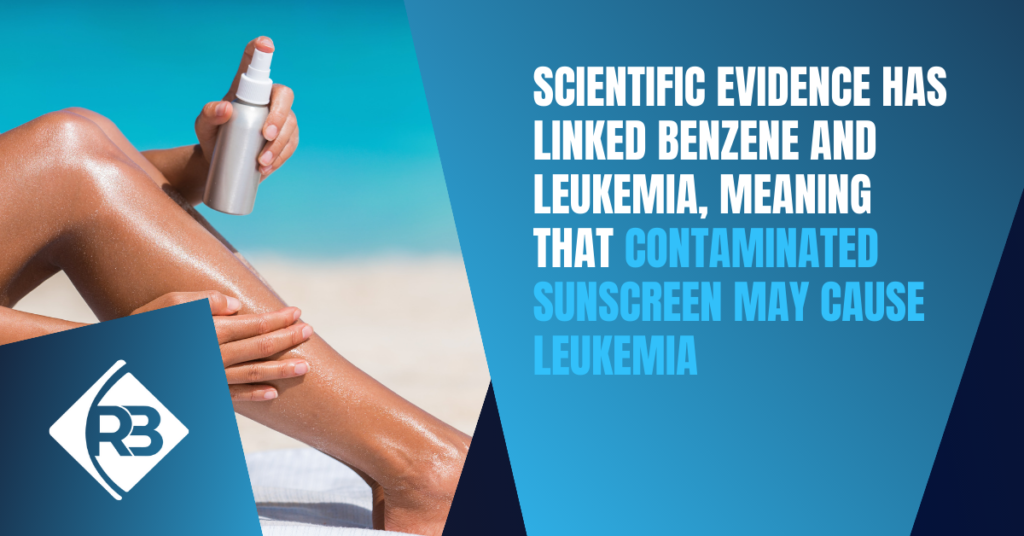Does Benzene in Sunscreen Cause Leukemia?
Benzene has been found in several popular brands of spray-on sunscreen, including Neutrogena and Aveeno. In the wake of these alarming findings, consumers are asking, “Does benzene in sunscreen cause leukemia?” Benzene is a known carcinogen, meaning it can cause cancer in humans and has been linked to various types of cancer, including leukemia, multiple myeloma, and non-Hodgkin’s lymphoma.
In this article, we’ll take a look at the potential link between benzene and leukemia that may affect the health of consumers who have used certain spray-on sunscreens. We’ll also look at how the potential link may affect ongoing sunscreen lawsuits alleging that contaminated sunscreen caused leukemia.
AUGUST 2023 UPDATE: Please note that as of August 2023, we can no longer accept cases involving benzene contamination due to developments in the litigation. Please stay tuned to our website for more information as this litigation evolves.
Benzene and Leukemia
 Multiple scientific studies have linked benzene and various types of leukemia, including acute myeloid leukemia (AML), acute lymphocytic leukemia (ALL), chronic lymphocytic leukemia (CLL), multiple myeloma, and non-Hodgkin’s lymphoma.
Multiple scientific studies have linked benzene and various types of leukemia, including acute myeloid leukemia (AML), acute lymphocytic leukemia (ALL), chronic lymphocytic leukemia (CLL), multiple myeloma, and non-Hodgkin’s lymphoma.
Government agencies that have designated benzene as a known cancer-causing chemical include the Centers for Disease Control and Prevention (CDC), the Food and Drug Administration (FDA), and the Environmental Protection Agency (EPA). The World Health Organization (WHO) also calls exposure to benzene “a major public health concern” due to its connection to leukemia and other forms of cancer.
Does Contaminated Sunscreen Cause Leukemia?
In determining whether benzene-contaminated sunscreen may cause leukemia, it’s important to consider the scientific evidence supporting a connection between benzene and leukemia.
Many studies have been conducted to determine if benzene (such as has been found in various types of spray-on sunscreens) causes leukemia. Research that has demonstrated a connection between benzene and increased risk of leukemia includes:
- A 2012 literature review in the International Journal of Environmental Research and Public Health that found that “these and subsequent studies supported the concept that benzene is a leukemogen,” meaning it can cause leukemia.
- A 2012 study in Carcinogenesis that found that “benzene causes acute myeloid leukemia and probably other hematological malignancies.”
- A 2010 study of workers exposed to benzene published in Environmental Health that concluded there is “consistent evidence that exposure to benzene at work increases the risk of leukemia.”
- A 2018 study in the Journal of Cancer Epidemiology that found “a higher risk level for AML [acute myeloid leukemia] … in children in association with higher outdoor benzene levels at their residence.” The study also determined that there is a “positive association between benzene levels during pregnancy and NHL [non-Hodgkin’s lymphoma].”
Aveeno and Neutrogena Sunscreens and Leukemia Risk
Given the strong scientific evidence linking benzene to various forms of leukemia, including AML, ALL, CLL, multiple myeloma, and non-Hodgkin’s lymphoma, it is reasonable to assume that benzene-contaminated sunscreen may cause leukemia.
What is Benzene?
Benzene is a chemical that is colorless or light yellow liquid at room temperature. Many scientific studies have linked benzene to various types of leukemia.
“Where Does Benzene Exposure Occur?”
Benzene exposure most frequently occurs through the air. According to the CDC, outdoor air contains low levels of benzene associated with:
- tobacco smoke
- gas stations
- vehicle exhaust fumes
- industrial emissions
Indoor air generally contains higher levels of benzene, from sources such as glue, paint, furniture wax, detergents, and cleaners. Benzene can also leak from underground waste and fuel containers and in some cases may contaminate well water.
What is Leukemia?
Leukemia is a cancer of blood cells, most frequently white blood cells. There are many different types of leukemia, including those that are slow-growing (chronic) or fast-growing (acute). Leukemia can begin either in the myeloid cells or lymphoid cells. Treatment options vary based on the type and aggressiveness of the specific leukemia.
Types of leukemia include:
- Acute lymphocytic leukemia (ALL)
- Acute myeloid leukemia (AML)
- Chronic lymphocytic leukemia (CLL)
- Chronic myeloid leukemia (CML)
- Chronic myelomonocytic leukemia (CMML)
- Child leukemia
Symptoms of leukemia often vary from patient to patient, but according to the Mayo Clinic, common symptoms include:
- Fever or chills
- Persistent weakness or fatigue
- Frequent or severe infections
- Unexplained weight loss
- Swollen lymph nodes, enlarged liver or spleen
- Easily bruising or bleeding
- Recurrent nosebleeds
- Petechiae (tiny red spots on your skin)
- Excessive sweating, especially at night
- Bone pain or tenderness
IMPORTANT: If you’ve experienced any of these or other symptoms of leukemia, contact your doctor right away.
“I’ve Used a Benzene-Contaminated Sunscreen and Developed Leukemia. What Are My Legal Options?”
AUGUST 2023 UPDATE: Please note that as of August 2023, we can no longer accept cases involving benzene contamination due to developments in the litigation. Please stay tuned to our website for more information as this litigation evolves.
If you or a loved one has used a benzene-contaminated sunscreen such as certain varieties of Neutrogena and Aveeno spray-on sunscreens and later developed leukemia, you may be entitled to compensation in a sunscreen leukemia lawsuit. For a FREE, no-obligation consultation with an experienced product liability attorney handling sunscreen cancer lawsuits, please call 1-800-525-7111 or complete the convenient form below.
“This settlement changed me and my family’s lives.”
–Linda B., Riddle & Brantley client
There are no upfront costs and you won’t pay any attorney fees unless we recover compensation for you. Call 1-800-525-7111 and let’s see how we can help. We would love to help you and your loved ones however we can. Justice Counts.